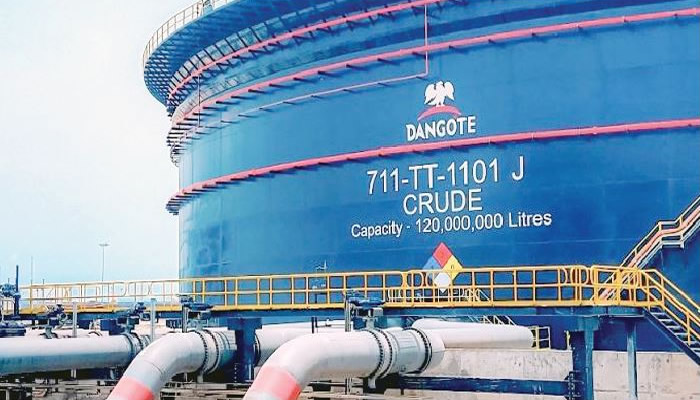By Aliu Akeem

The head of Ghana’s oil regulator stated on Monday that once Nigeria’s Dangote Petroleum Refinery is fully operational, Ghana could purchase petroleum products from the facility, reducing the need for more costly exports from Europe.
According to Mustapha Abdul-Hamid, the chairman of Ghana’s National Petroleum Authority, this could eliminate $400 million in fuel imports from Europe each month. According to Reuters, he gave a speech at the OTL Africa Downstream oil conference in Lagos.
On September 15, 2024, the $20 billion Dangote refinery in Lekki began releasing Premium Motor Spirit, also known as gasoline, into the Nigerian market.
In spite of this, Nigerian marketers have started importing hundreds of millions of liters of PMS since the Federal Government completely deregulated the country’s downstream oil industry.
The Ghanaian petroleum authority official, however, said during the event in Lagos on Monday that his nation may begin importing fuel from the refinery in Nigeria.
Hamid stated, “It will be much easier for us to import from Nigeria and I believe that will lower our prices if the refinery reaches 650,000 bpd a day capacity because all that volume cannot be consumed by Nigeria alone.” Currently, we import from Rotterdam.

According to analysts, the Dangote refinery, which was constructed by Nigerian billionaire Aliko Dangote, is anticipated to run close to capacity by the end of the year and may be fully operational by the first quarter of 2025.Hamid claimed that by eliminating freight expenses, importing from Nigeria instead of Europe would result in lower prices for other goods and services. He predicted that African nations would eventually settle on a single currency, which would reduce demand for US dollars.
The robust growth of the extractive industry, which has increased demand for fuel, has been a major factor in Ghana’s economy, which expanded 6.9% year over year in the second quarter of 2024.
Farouk Ahmed, the CEO of the Nigerian Midstream and Downstream Petroleum Regulatory Authority, stated during the event in Lagos that the Dangote refinery will increase fuel supply after it is finished and licensed.
In February 2024, Dangote Petroleum Refinery and Petrochemical Limited began operations to produce a variety of petroleum products, including aviation fuel and automotive gas oil.In September 2024, the refinery started producing and supplying Premium Motor Spirit. When it is finished and licensed, it is anticipated that the factory’s supply will greatly improve,” he stated.
Since it started operations in February, the multibillion dollar facility has been supplying aviation fuel and diesel to both domestic and foreign markets.
Nigeria’s decades-long reliance on imported finished petroleum products was ended by the refinery.
Despite numerous attempts to modernize them, the three refineries in the nation that are run by the Nigerian National Petroleum Company Limited have lain idle for a number of years.
In order to increase the product’s accessibility and affordability for consumers across the country, Ahmed urged stakeholders to establish a comprehensive domestic pricing framework for liquefied petroleum gas.
He emphasized that the agency has been working with stakeholders on domesticating LPG made in nations by companies like Mobil Producing Nigeria Ltd., Chevron Nigeria Ltd., the Nigerian LNG, and others in an effort to lower the cost of cooking gas.
In order to make LPG easily accessible and reasonably priced for consumers, NMDPRA will work with stakeholders to develop a domestic pricing framework. In order to address current and new issues, we will keep holding quarterly domain-specific meetings with important stakeholders and on-demand meetings with other pertinent parties in relation to alliances,” he stated.
Ahmed insisted that by implementing strong regulations and offering substantial incentives to attract investment from both domestic and foreign businesses, the Federal Government is further liberalizing the energy market.
















